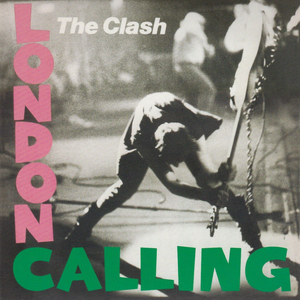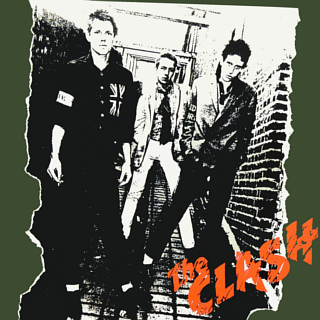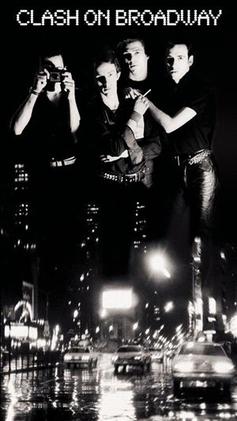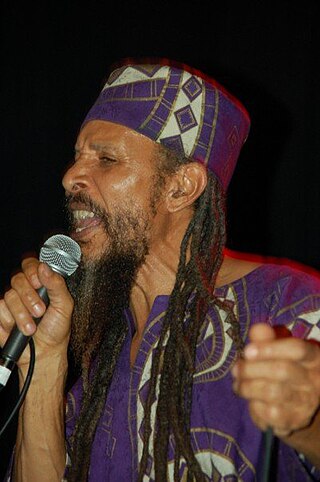Related Research Articles

The Clash were an English rock band that formed in London in 1976 and were key players in the original wave of British punk rock. Billed as "The Only Band That Matters", they used elements of reggae, dub, funk, ska, and rockabilly, and they contributed to the post-punk and new wave movements that followed punk. For most of their recording career, the Clash consisted of lead vocalist and rhythm guitarist Joe Strummer, lead guitarist and vocalist Mick Jones, bassist Paul Simonon, and drummer Nicky "Topper" Headon.

London Calling is the third studio album by the English rock band the Clash. It was originally released as a double album in the United Kingdom on 14 December 1979 by CBS Records, and in the United States in January 1980 by Epic Records.

Lee "Scratch" Perry was a Jamaican record producer, composer and singer noted for his innovative studio techniques and production style. Perry was a pioneer in the 1970s development of dub music with his early adoption of remixing and studio effects to create new instrumental or vocal versions of existing reggae tracks. He worked with and produced for a wide variety of artists, including Bob Marley and the Wailers, Junior Murvin, The Congos, Max Romeo, Adrian Sherwood, Beastie Boys, Ari Up, The Clash, The Orb, and many others.

The Clash is the debut studio album by the English punk rock band the Clash, released on 8 April 1977 through CBS Records. Recorded and mixed over three weeks in February 1977 for £4,000, it would go on to reach No. 12 on the UK charts, and has been included on many retrospective rankings as one of the greatest punk albums of all time.

Sandinista! is the fourth studio album by the English punk rock band the Clash. It was released on 12 December 1980 as a triple album containing 36 tracks, with 6 songs on each side. It crosses various genres including funk, reggae, jazz, gospel, rockabilly, folk, dub, rhythm and blues, calypso, disco, and rap. For the first time, the band's songs were credited to the Clash as a group, rather than to Joe Strummer and Mick Jones. The band agreed to a decrease in album royalties in order to release the 3-LP at a low price.

Bob Marley and the Wailers were a Jamaican ska, rocksteady and reggae band. The founding members, in 1963, were Bob Marley, Peter Tosh, and Bunny Wailer.
Super Black Market Clash is a 1993 compilation album released by the English punk rock band The Clash. It contains B-sides and rare tracks not available on the group's regular studio albums. The album is an expanded repackaging of the 1980 release Black Market Clash, a 10-inch EP containing nine songs. The man in the foreground of the front cover art on both releases is Don Letts, who worked with The Clash on several projects and later was a founding member of Big Audio Dynamite.

"London Calling" is a song by the British punk rock band the Clash. It was released as a single from the band's 1979 double album of the same name. This apocalyptic, politically charged rant features the band's post-punk sound, electric guitar and vocals.
Donat Roy Mittoo, better known as Jackie Mittoo, was a Jamaican-Canadian keyboardist, songwriter and musical director. He was a member of The Skatalites and musical director of the Studio One record label.
Lester Bullock, better known by the stage name Dillinger, is a Jamaican reggae artist. He was part of the second wave of deejay toasters who rose to prominence during the mid-1970s.

The discography of the British punk rock band the Clash consists of six studio albums, two extended plays, two live albums and 31 singles.

The Story of the Clash, Vol. 1 is a double-disc compilation album by the English punk rock band the Clash. Consisting of 28 tracks, it was released on 21 March 1988 by Epic Records. The compilation presents a relatively thorough overview of their career, but does not feature any material from their final studio album, Cut the Crap (1985). An anticipated second volume was to have consisted of live recordings but remains unreleased, although a live compilation, From Here to Eternity: Live, was released in 1999. The original vinyl set was released with four different colored cover variations: red, blue, yellow and green. The compilation was promoted by reissued singles of "I Fought the Law" and "London Calling".
"Police and Thieves" is a reggae song first recorded by the falsetto singer Junior Murvin in 1976. It was covered by the punk band The Clash and included on their self-titled debut album released in 1977.

Clash on Broadway is a box set compilation album by the English punk rock band the Clash, released on Legacy Records in 1991. It comprises 64 tracks on three compact discs, spanning the time period from their 1977 debut single, "White Riot", through the Combat Rock album of 1982. It does not include material from the band's final sessions led by Joe Strummer and Paul Simonon, resulting in the final album Cut the Crap (1985). It was initially released in longbox form.
"The Guns of Brixton" is a song by the English punk rock band the Clash, originally released on their 1979 album London Calling. It was written and sung by bassist Paul Simonon, who grew up in Brixton, South London. The song has a strong reggae influence, reflecting the culture of the area and the reggae gangster film The Harder They Come.
"Revolution Rock" is a song written and originally recorded by Danny Ray and covered by the Clash, featuring on their 1979 album London Calling. Ray's version of the song was released as a single to modest success. According to Paul Simonon, "Danny Ray put out his version of "Revolution Rock" just before we were recording London Calling." Ray sampled the Jackie Edwards song "Get Up" on the track, so Edwards is listed as the co-writer. In the Clash's version Joe Strummer changed several of the lyrics, including a reference to Mack the Knife and the trend of smashing up seats at punk shows.

Willi Williams is a Jamaican reggae and dub musician and producer. He is known as the "Armagideon Man" after his hit, "Armagideon Time", first recorded in 1977 at Studio One in Kingston. The song was covered by The Clash as the flipside of their "London Calling" single.

"Clash City Rockers" is a song by English rock band the Clash. It was first released in February 1978 as a single with the B-side "Jail Guitar Doors", the latter a re-worked version of a song from Joe Strummer's pub rock days. "Clash City Rockers" was the second of three non-album singles released between the group's eponymous first album in 1977 and their second album, Give 'Em Enough Rope (1978). It was later included as the opening track of the belated US version of the band's debut album.
"Real Rock" is an instrumental reggae song by the Jamaican band Sound Dimension. It was recorded in 1967 at Jamaica Recording Studio in Kingston, Jamaica, and released as a single in 1968 by Studio One. The song was produced by Clement "Coxsone" Dodd and performed by Eric Frater (guitar), Boris Gardiner, Phil Callender (drums), Denzel Laing (percussion), Vin Gordon (trombone) and Jackie Mittoo (keyboards), who played the riddim's signature three-note Hammond organ figure.
Summer Records was a Canadian reggae record label, active between the mid-1970s and late 1980s. Based in Malton, Ontario, a suburb of Toronto, it became one of Canada's first Black-owned record labels, as well as one of the first to release Canadian-made reggae music.
References
- ↑ Greene, Jo-Ann. "Armagideon Time - Willie Williams | Song Info | AllMusic". AllMusic . Retrieved February 21, 2018.
- ↑ Kenner, Rob (May 23, 2004). "MUSIC; 'Real Rock' Through the Ages". The New York Times . ISSN 0362-4331 . Retrieved February 21, 2018.
- ↑ "Armagideon Time by Willie Williams on WhoSampled". WhoSampled . Retrieved February 21, 2018.
- 1 2 3 4 5 Gray, Marcus (2009). Route 19 Revisited: The Clash and London Calling. pp. 378–9.